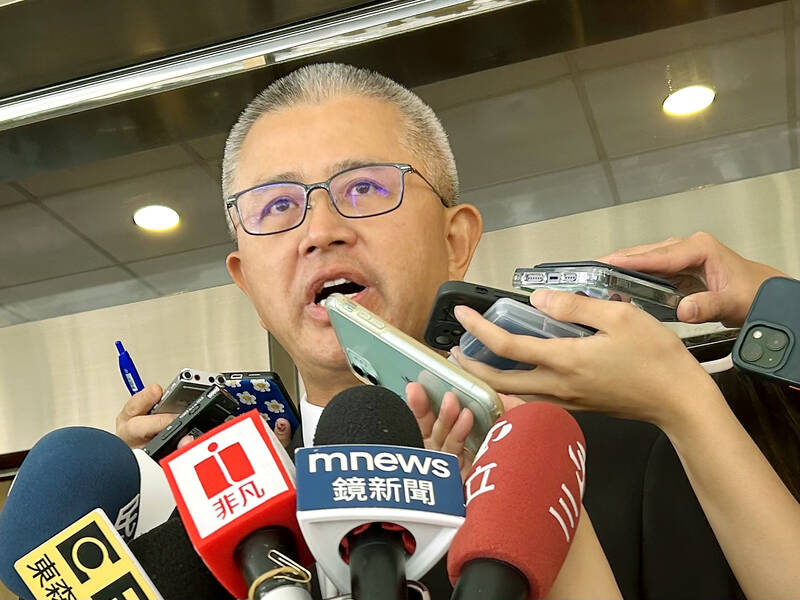Activist shareholders won the majority of board seats at Shin Kong Financial Holding Co (新光金控) on Friday, ending decades of control by founder and former chairman Eugene Wu (吳東進).
Activist shareholders led by the company’s former board director Hung Shih-chi (洪士琪) won 10 of 15 seats on the 21-year-old company’s board.
Among the 10 seats, eight are directors — including former Chang Hwa Bank (彰化銀行) chairman and former Taishin Financial Holding Co (台新金控) president Julius Chen (陳淮舟), former KGI Bank (凱基銀行) chairman Mark Wei (魏寶生) and Hung — and two are independent directors.

Photo: Wu Hsin-tien, Taipei Times
Chen was later elected as Shin Kong Financial chairman.
Eugene Wu and his allies gained five seats on the company’s board: his daughter, Shin Kong Financial president Olivia Wu (吳欣儒); Shin Kong Commercial Bank (新光銀行) chairman Lee Tseng-chang (李增昌); and MasterLink Securities Co (元富證券) chairman Joey Chen (陳俊宏).
About 85 percent of shareholders cast votes in the board election, the company said.
“Today marks a milestone for Shin Kong Financial as we make the first step toward reform,” Hung told reporters after the annual shareholders’ meeting in Taipei.
Hung had been critical about Shin Kong Financial’s operations, saying that the company’s share price was much lower than its book value.
However, he praised the company’s management team, including Olivia Wu and former chairman Victor Hsu (許澎), saying that they had worked hard over the past three years.
Eugene Wu urged all newly elected board directors to work together and make decisions in the interest of all shareholders, “especially regarding possible mergers and acquisitions in the future,” he said in a statement.
Eugene Wu said that he regretted the outcome of the election, but did not find it surprising.
He would not be adjusting his stake in Shin Kong Financial, he said, adding that the board directors nominated by him would continue to support the company.

BYPASSING CHINA TARIFFS: In the first five months of this year, Foxconn sent US$4.4bn of iPhones to the US from India, compared with US$3.7bn in the whole of last year Nearly all the iPhones exported by Foxconn Technology Group (富士康科技集團) from India went to the US between March and last month, customs data showed, far above last year’s average of 50 percent and a clear sign of Apple Inc’s efforts to bypass high US tariffs imposed on China. The numbers, being reported by Reuters for the first time, show that Apple has realigned its India exports to almost exclusively serve the US market, when previously the devices were more widely distributed to nations including the Netherlands and the Czech Republic. During March to last month, Foxconn, known as Hon Hai Precision Industry

Taiwan Semiconductor Manufacturing Co (TSMC, 台積電) and the University of Tokyo (UTokyo) yesterday announced the launch of the TSMC-UTokyo Lab to promote advanced semiconductor research, education and talent development. The lab is TSMC’s first laboratory collaboration with a university outside Taiwan, the company said in a statement. The lab would leverage “the extensive knowledge, experience, and creativity” of both institutions, the company said. It is located in the Asano Section of UTokyo’s Hongo, Tokyo, campus and would be managed by UTokyo faculty, guided by directors from UTokyo and TSMC, the company said. TSMC began working with UTokyo in 2019, resulting in 21 research projects,

Ashton Hall’s morning routine involves dunking his head in iced Saratoga Spring Water. For the company that sells the bottled water — Hall’s brand of choice for drinking, brushing his teeth and submerging himself — that is fantastic news. “We’re so thankful to this incredible fitness influencer called Ashton Hall,” Saratoga owner Primo Brands Corp’s CEO Robbert Rietbroek said on an earnings call after Hall’s morning routine video went viral. “He really helped put our brand on the map.” Primo Brands, which was not affiliated with Hall when he made his video, is among the increasing number of companies benefiting from influencer

Quanta Computer Inc (廣達) chairman Barry Lam (林百里) yesterday expressed a downbeat view about the prospects of humanoid robots, given high manufacturing costs and a lack of target customers. Despite rising demand and high expectations for humanoid robots, high research-and-development costs and uncertain profitability remain major concerns, Lam told reporters following the company’s annual shareholders’ meeting in Taoyuan. “Since it seems a bit unworthy to use such high-cost robots to do household chores, I believe robots designed for specific purposes would be more valuable and present a better business opportunity,” Lam said Instead of investing in humanoid robots, Quanta has opted to invest